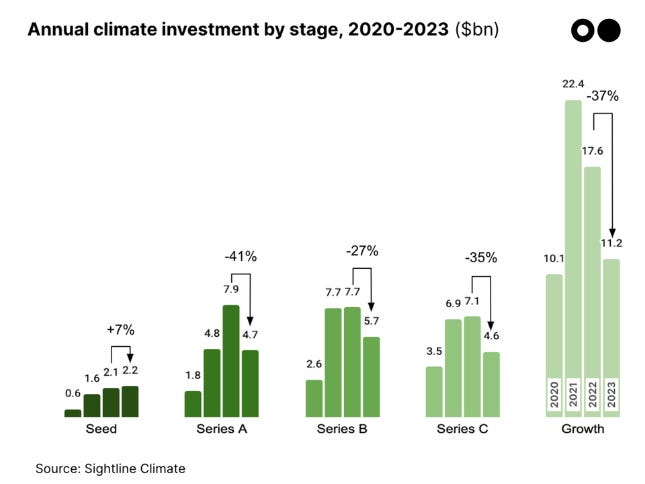🌍 We’re not investing climate dollars responsibly [graph]
Vol. 137: A [nail-biting] 2023 summary of climate tech investment. 10 [polite] ways to say “no” to things you don’t want to do. AI tool lets you be a university scientist in just 10 seconds.
Join 16,000+ other entrepreneurs and investors who get our two-minute newsletter with actionable insights on climate startups and personal growth. (Read the archives)
Today’s 4 topics.
📊 A [nail-biting] year-end summary of climate tech investment 2023 [graph]
💰 We’re not investing climate dollars responsibly [graph]
🧑🏽🔬 This new AI tool lets you be a university scientist in just 10 seconds
⛔ 10 [polite] ways to say “no” to things you don’t want to do
1.
📊 A [nail-biting] year-end summary of climate tech investment 2023.
The excellent women (and men 😅) at CTVC (now a product of parent company Sightline) did some awesome (albeit sobering) work on this.
(Public version and client version.)
Summary below.
Funding in 2023 was down 30% from 2022. 😭
Series A investment was down 11%, late-stage investment dropped over 35%, and average round size fell 28%. 😞
Investment in food and land use fell off a cliff at -55%, leaving transportation, energy, and (now) industrials as the top three sectors. 😱
But don’t despair…
Since 2020, about 2,600 climate tech companies have raised $142B of venture funding across 4,156 deals, and funding has grown annually at 23%. 🎉 👍🏼
2.
💰 We’re not investing climate dollars responsibly. [graph]
OK, that headline might be a slight overstatement.
But here’s what I mean.
The 1st (left) bar in this visual from PwC shows the contribution of five sectors to global GHG emissions.
The 2nd and 3rd bars show where VC investment has been allocated over the last decade or so.
The percentages across these three bars don’t match. But ideally, they should.
Oh wait, investing is not just about science. It’s also about TAM, IRR, etc. 😮
What to do?
If all else were equal (never true), founders and investors should focus less on energy and mobility sectors, and more on startup opportunities in the built environment, food and agriculture, and industrials.
3.
🧑🏽🔬 This new AI tool lets you be a university scientist in just 10 seconds.
Imagine reading an article that says:
“Studies report that eating a diet of 100% bacon boosts longevity by 7.4 years.”
You might be doubtful and think:
“If I had time, I’d like to see that study, and 100 others, to see what’s really true.”
[Or you might just buy a pig. 🐖]
If the former describes you, then this AI tool — Perplexity — can help you review dozens of peer-reviewed scientific papers in seconds.
To nerd out more, read more use cases in the fourth section of this delightfully geeky article. 🤓
4.
⛔ 10 [polite] ways to say “no” to things you don’t want to do.
You may be thinking:
“This is easy. It’s just two letters. Say them back to back. N. O. ‘No.’ Done.” 🙄
That’s true — If we were not a social species. If we were robots. 🤖
As you seek to prioritize your priorities this year, here are ten versions to try. 👍
Sadly, I have something else going on.
I have another commitment.
I wish I were able to.
I’m afraid I can’t.
I don't have the bandwidth for that right now.
I’m honored you asked me, but I simply can’t.
Thanks for thinking of me. However, I’m not able to.
I’m sorry, I’m not able to fit this in.
Unfortunately, I already have plans. Maybe next time!
No, thank you, but it sounds lovely.
Dig deeper into guilt, social pressure, and freedom here. 😟
That’s all, y’all.
Make it a great week because it’s usually a choice.
~ Chris
Founder @ Entrepreneurs for Impact
—
P.S. Did you know that CEOs who are members of CEO peer groups tend to grow their businesses faster than their peers? Check out our community for climate tech CEOs at Entrepreneurs for Impact.
—
(As these photos show, I’m an actual human writing this newsletter. Not AI. 🤖)









